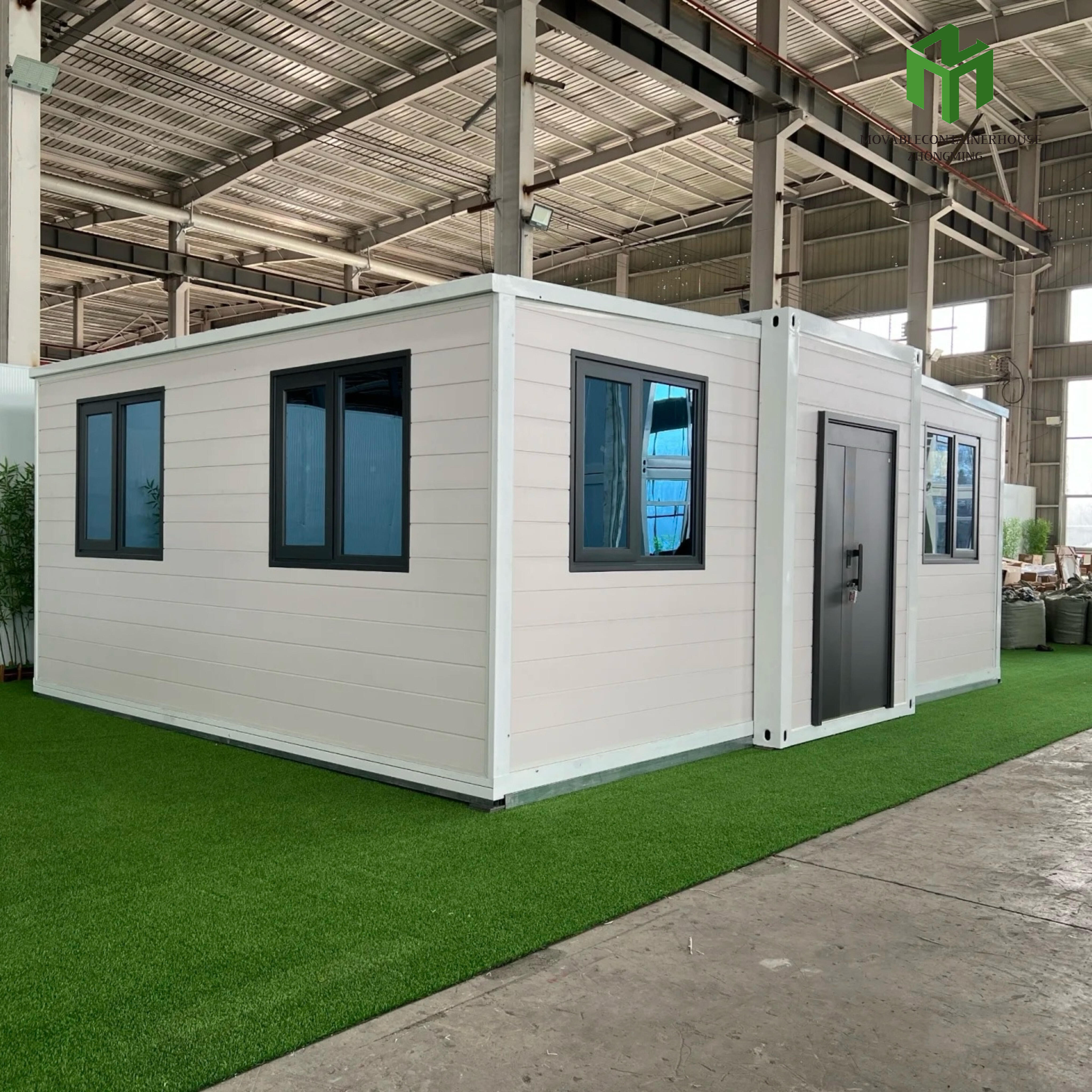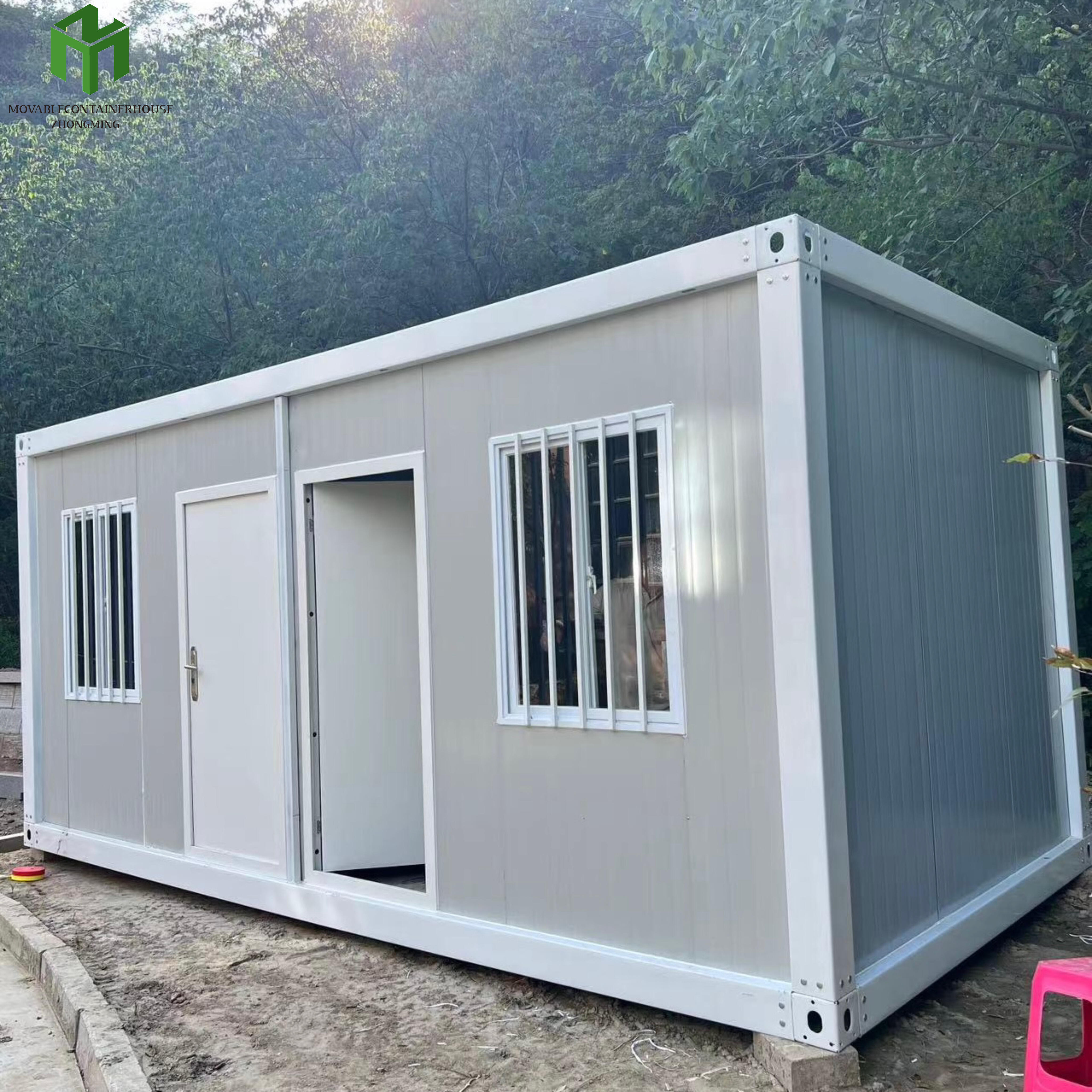Komercinių erdvių revoliucija per konteinerinę architektūrą
Komercinė nekilnojamojo turto sritis išgyvena dramatišką permainą, atsiradus plokščiųjų konteinerių namai kaip universalius verslo sprendimus. Šios inovatyvios konstrukcijos keičia tai, kaip įmonės vertina patalpų naudojimą, sąnaudų valdymą ir tvarų vystymąsi. Sujungdamos šiuolaikines dizaino principas su praktine funkcionalumu, šios modulinės struktūros tampa vis populiaresnės įvairiose pramonės šakose, siūlydamos lankstumą ir efektyvumą, kurių tradicinės statybos metodai vargu ar gali pasiekti.
Šiuolaikinės įmonės atranda, kad plokščiai supakuoti konteineriniai namai reiškia daugiau nei tik alternatyvų statybos metodą – jie atspindi visišką paradygmos pasikeitimą komercinių erdvių planavime. Jų lankstumas, greitas diegimas ir ekologiškumas daro juos ypač patrauklius verslams, kurie siekia įsteigti ar išplėsti savo fizinę buveinę, išlaikydami operacinį mobilumą.
Prekyba ir laikinos parduotuvės
Dinamiškų pirkimo patirčių kūrimas
Prekybininkai priima plokščiai supakuotus konteinerinius namus kaip idealų sprendimą laikinoms ar nuolatinėms prekybos vietoms kurti. Šios konstrukcijos gali būti greitai surinktos intensyviai naudojamose teritorijose, leidžiant prekių žymėms išbandyti naujas rinkas be didelių investicijų tradicinėje nekilnojamojo turto srityje. Šių konteinerių modulinė gamta leidžia kurti kūrybiškas dizaino konfigūracijas, kurios patraukia vartotojų dėmesį ir suteikia unikalias pirkimo patirtis.
Konteinerinės architektūros vizualinis patrauklumas suteikia paslaptingumo ir inovacijų elementą, ko dažnai trūksta tradicinėms parduotuvėms. Prekės žankos gali šiuos erdves pritaikyti sau – įrengdamos didelius langus, išskirtinį apšvietimą bei prekės žankai būdingus elementus, kad sukurtų atmintiną prekybos aplinką, kuri atsiliepia šiuolaikiniams vartotojams.
Mobilieji prekybos sprendimai
Viena iš pagrindinių plokščiai surinkiamų konteinerių namų privalumų prekyboje yra jų mobilumas. Verslai gali lengvai perkelti savo parduotuves, kad sektų sezoninį paklausą ar dalyvauti įvairiuose renginiuose ir turguose per metus. Ši lankstumas leidžia prekybininkams maksimaliai padidinti savo buvimą aukščiausios prekybos sezono metu ir išlaikyti sąnaudų efektyvumą lėtesniais sezonais.
Galimybė greitai surinkti ir išardyti šias konstrukcijas daro jas idealias laikinoms prekybos idėjoms, laikiniesiems salonams ir sezoniniams turgavietėms. Prekybininkai gali išlaikyti naują ir įdomią buvimą rinkoje, tuo pačiu mažindami riziką, susijusią su ilgalaikiais nuomos įsipareigojimais.
Biuro ir darbo vietų sprendimai
Šiuolaikinio darbo vietos dizainas
Korporatyvus pasaulis atranda, kad plokščiųjų pakuočių konteinerių namai siūlo inovatyvius sprendimus moderniems biuro aplinkos kūrimui. Šios konstrukcijos gali būti suprojektuotos taip, kad tilptų atvirų planų darbo vietos, privačios patalpos, posėdžių kambariai ir bendradarbiavimo erdvės. Konteinerinės architektūros pramoninis estetinis vaizdas, derinamas su šiuolaikiniu vidaus dizainu, sukuria unikalias ir įkvėpiančias darbo aplinkas, kurios patraukliai atrodo šiandienos darbuotojams.
Įmonės gali lengvai išplėsti savo biuro plotą, pridėdamos ar pertvarkydamos konteinerių modulius, kai keičiasi jų poreikiai. Toks mastelio keitimas ypač vertingas augančioms įmonėms, kurios reikalauja lankstaus erdvinio sprendimo be tradicinių biuro nuomos apribojimų.
Nuotolinių vietovių biurai
Verslams, veikiantiems nuosekliose vietovėse ar laikinose projekto aikštelėse, plokščiai supakuoti konteineriniai namai suteikia idealius biuro sprendimus. Šios patalpos gali būti greitai įdiegtos statybos aikštelėse, kasyklose ar žemės ūkio projektuose, užtikrindamos patogią ir profesionalią darbo aplinką vietovėse, kur tradicinė statyba gali būti nepatogi ar per brangi.
Konteinerinių konstrukcijų ilgaamžiškumas ir atsparumas orų sąlygoms daro juos tinkamus įvairioms klimato sąlygoms, o jų modulinė struktūra leidžia lengvai pervežti į naujas vietas, kai projektai vystosi arba baigiasi.

Hospitaliteto ir maisto aptarnavimo taikymas
Restoranai ir kavinės
Maisto paslaugų pramonė rado kūrybingų būdų, kaip naudoti plokščiai supakuotus konteinerinius namus restoranų ir kavinių sąvokoms. Šios konstrukcijos gali būti perdirbtos į stilingas valgymo vietoves su visomis virtuvės patalpomis, sėdimosi zonomis ir lauko terasomis. Unikali architektūra dažnai tampa išskirtine savybe, traukiančia klientus ir sukuriančia nepamirštamas valgymo patirtis.
Restoranų verslo žmonės vertina sumažintas pradines investicijas lyginant su tradicine statyba, taip pat galimybę perkelti ar išplėsti savo veiklą priklausomai nuo verslo rezultatų ir rinkos poreikių.
Viešbučiai ir apgyvendinimo vienetai
Inovatyvūs viešbučių savininkai naudoja plokščiai supakuotus konteinerinius namus, kad sukurtų unikalias apgyvendinimo patirtis. Šie vienetai gali būti suplanuoti į patogias viešbučių kambarių patalpas, butikines palydovines ar prabangias glampingo patalpas. Konteinerinių konstrukcijų modulinė gamta leidžia kūrybiškai išdėstyti jas taip, kad būtų maksimaliai panaudoti vaizdai ir sukurtų įdomūs erdvės santykiai tarp vienetų.
Greitas surinkimas ir galimybė perkelti padaro konteinerių viešbučius ypač tinkamus sezoninėms turizmo vietovėms ar laikinoms gyvenamąsias aplinkoms didelių renginių ar švenčių metu.
Renginių ir parodų erdvės
Laikini renginių paviljonai
Renginių organizatoriai ir parodų dalyviai vis dažniau kreipiasi į plokščiai supakuotus konteinerių namus, kad sukurtų įspūdingas laikinas vietas. Šios konstrukcijos gali būti greitai surenkamos meno parodom, produktų pristatymams, korporaciniams renginiams ir prekybos parodomis. Konteinerių pramoninis estetinis vaizdas suteikia šiuolaikišką atspalvį renginiams, kartu užtikrindamas praktiškas patogumus ir apsaugą nuo oro sąlygų.
Galimybė derinti konteinerių konfigūracijas leidžia renginių organizatoriams kurti unikalias erdvinio plano išdėstymo schemos, kurios gerina lankytojų judėjimą ir patirtį. Kelios vienETės gali būti sujungtos, kad būtų sukurta didesnė erdvė su atskirais sektoriais skirtingoms veikloms ar parodom.
Rinkodara ir prekės ženklo aktyvavimas
Prekės ženklai naudoja plokščiąja pakuote sumontuojamus konteinerinius namus kaip galingus marketingo įrankius produktų demonstravimui, prekės ženklo aktyvacijai ir patirties rinkodaros kampanijoms. Šios mobilios konstrukcijos gali būti suprojektuotos taip, kad sukurtų paniriamąją prekės ženklo patirtį, kuri sudomintų klientus ir patrauktų dėmesį socialiniuose tinkluose.
Konteinerinės architektūros universalumas leidžia kurti kūrybinius projektus, kuriuos galima diegti įvairiose vietose – nuo miestų centrų iki muzikos festivalių – taip maksimaliai padidinant prekės ženklo matomumą ir vartotojų sąveiką.
Dažniausiai užduodami klausimai
Kiek laiko užtrunka plokščiąja pakuote sumontuojamo konteinerinio namo surinkimas komerciniam naudojimui?
Surinkimo trukmė kinta priklausomai nuo konstrukcijos dydžio ir sudėtingumo, tačiau dauguma komercinių plokščiąja pakuote sumontuojamų konteinerinių namų gali būti surinkti per 1–3 dienas su profesionalia komanda. Į tai įeina pagrindiniai vidaus apdailos darbai ir komunikacijų prijungimas, nors sudėtingesniems individualiems sprendimams gali reikėti papildomo laiko.
Ar plokščiąja pakuote sumontuojami konteineriniai namai tinka pastovioms komercinėms instalacijoms?
Taip, šios konstrukcijos skirtos naudoti tiek laikinai, tiek nuolat. Su tinkamu pamatu įrengimu, izoliacija ir priežiūra plokščiai supakuoti konteinerių namai gali veikti kaip ilgalaikės komercinės patalpos, išlaikydami jų perkeltinumo privalumus.
Kokie yra plokščiai supakuotų konteinerių namų naudojimo komerciniais tikslais kainos privalumai?
Plokščiai supakuoti konteinerių namai paprastai siūlo didelius kainos taupymo privalumus lyginant su tradicine statyba, sumažinant darbo jėgos sąnaudas, trumpinant statybos trukmę ir mažinant medžiagų atliekas. Be to, dėl jų modulinės prigimties galima etapais plėtoti patalpas, todėl verslas gali efektyviau valdyti kapitalines išlaidas.
Turinio lentelė
- Komercinių erdvių revoliucija per konteinerinę architektūrą
- Prekyba ir laikinos parduotuvės
- Biuro ir darbo vietų sprendimai
- Hospitaliteto ir maisto aptarnavimo taikymas
- Renginių ir parodų erdvės
-
Dažniausiai užduodami klausimai
- Kiek laiko užtrunka plokščiąja pakuote sumontuojamo konteinerinio namo surinkimas komerciniam naudojimui?
- Ar plokščiąja pakuote sumontuojami konteineriniai namai tinka pastovioms komercinėms instalacijoms?
- Kokie yra plokščiai supakuotų konteinerių namų naudojimo komerciniais tikslais kainos privalumai?


